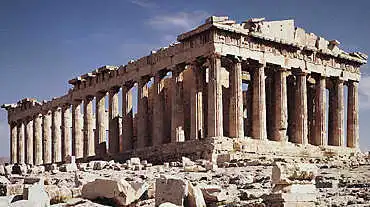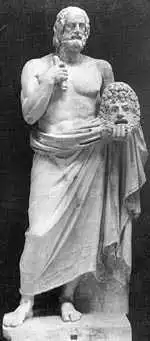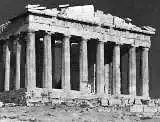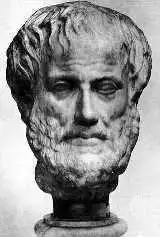Cosmos of the Ancients The Greek Philosophers on Myth and CosmologyEuripides uripides (480-406 BC) cannot be grouped among the philosophers, but in his plays some parts are serving well to illustrate by this one example, how questions on the gods and the myths of them could be treated by the writers of drama. He did, of course, allow discussions on cosmology and such to enter his plays through the mouths of their characters. That certainly does not imply their views being identical with his own, suffice it here to use him as example of in what manner these questions were discussed in his time.
uripides (480-406 BC) cannot be grouped among the philosophers, but in his plays some parts are serving well to illustrate by this one example, how questions on the gods and the myths of them could be treated by the writers of drama. He did, of course, allow discussions on cosmology and such to enter his plays through the mouths of their characters. That certainly does not imply their views being identical with his own, suffice it here to use him as example of in what manner these questions were discussed in his time.
 He lets one of his characters reason in Bacchae: "The goddess Demeter, — she is earth, call her by whichever name you wish." In the same monologue, the legend of Dionysos being sewn into the thigh of Zeus is explained as a change of word through time. Not that what Euripides regards as the authentic version is any less fabulous: "Having broken off a part of the air of heaven that encircles the earth, he gave this as a hostage, removing Dionysos from quarrels with Hera."
He lets one of his characters reason in Bacchae: "The goddess Demeter, — she is earth, call her by whichever name you wish." In the same monologue, the legend of Dionysos being sewn into the thigh of Zeus is explained as a change of word through time. Not that what Euripides regards as the authentic version is any less fabulous: "Having broken off a part of the air of heaven that encircles the earth, he gave this as a hostage, removing Dionysos from quarrels with Hera."
Another view, downright atheist in its reasoning along the lines repeated innumerable times in the Christian era — according to Euripides old already at his time, questioning how a benevolent god could allow injustice, is expressed in Bellerophon, a drama remaining only in fragments:
LiteratureEuripides, Bacchae, translated by Richard Seaford, Warminster 1996.Barnes, Jonathan, The Presocratic Philosophers, volume 2, London 1979.
© Stefan Stenudd 2000

The Greek Philosophers
AristotleIntroductionAristotle's LifeTimelineAristotle's PoeticsAristotle's CosmologyAbout CookiesMy Other WebsitesCREATION MYTHSMyths in general and myths of creation in particular.
TAOISMThe wisdom of Taoism and the Tao Te Ching, its ancient source.
LIFE ENERGYAn encyclopedia of life energy concepts around the world.
QI ENERGY EXERCISESQi (also spelled chi or ki) explained, with exercises to increase it.
I CHINGThe ancient Chinese system of divination and free online reading.
TAROTTarot card meanings in divination and a free online spread.
ASTROLOGYThe complete horoscope chart and how to read it.
MY AMAZON PAGE
MY YOUTUBE AIKIDO
MY YOUTUBE ART
MY FACEBOOK
MY INSTAGRAM
MY TWITTER
STENUDD PÅ SVENSKA
|
 Cosmos of the Ancients
Cosmos of the Ancients